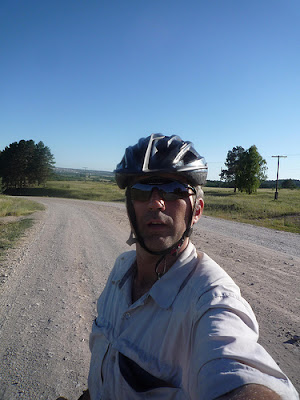Photos here. I leave Ulanbataar on a sunny afternoon. It gets progressively windy and cold as I leave the capital behind. Before darkness I ask for permission to pitch the tent next to a ger. The wind is howling and I fear a chilly night but when I start getting my tent out, the friendly people from the ger invite me to spend the night inside and I accept. Milk tea and snacks of bread and cheese are offered. It looks like the women are working in a potato field nearby and the men are herders, all of them dressed in traditional coats. A sheep is very carefully slaughtered and skinned. There's a total of 8 people in the ger. Some of them get up several times in the middle of night, get out and scream but although I know it's something to do with the livestock, I don't understand what's happening. Next morning I'm offered a horseback ride but I feel like Gulliver in Liliput. Nearby, a Buddhist cemetery and a statue of Buddha is being erected. After breakfast, I hit the road. It's getting warmer. In the evening, I set up camp next to another ger. A very chatty child talks and whispers to my ear. More milk tea and bread and cheese sticks. Wholesome Mongolian livelihood.
The following day I reach Bayangol, where the road meets the railway. I decide to take the train to Sukhbatar (150 km), near the Russian border, to make sure that I leave within my 30-day visa period. But I forget my mobile phone at the station and I must wait one day to get it back in Sukhbatar.
I leave Sukhbatar at around 7 in the morning. The border is 25 km away and I anticipate lots of red tape. In spite of the big queues and the Russians suspecting that my passport might be forged, I get through in less than one hour.
Everything looks very different after the border. The treeless steppe fade into lush forests and European faces are now in majority. The food in the cafe is varied and delicious. Buryatia. I have headwind for three days. Also rain and snow. Plus it's very hilly. In Kalinishnaya, Sveta, a Buryat woman, hosts me for the night. I'm very moved by her gesture. Next day, it's sunny but still very cold and with headwind, I realise that I'm not enjoying this and I get a lift to Ulan Ude, 120 kms away. But then in Ulan Ude, the weather gets really good again and I cycle to lake Baikal.
Even though is relatively warm during the day, I spend my first night out of Ulan Ude in the tent and the temperature drops to around -5 or -7 in the evening. I'm wearing everything I have on but I can hardly sleep. Next day I'm determined to find a cheap hotel along the road. The next big place is Kabansk but no hotels there and I ask around in the village of Nyuki and then a woman offers me to stay at her place with her familiy for the night. Saved from freezing! Lovely company, food and even banya!
The following day I get acquainted with lake Baikal. I realise how lucky I am. It's sunny and warm. The autumn colours are stunningly beautiful. In Babushkin, again, no hotels, but I manage to find accommodation in a private house. The next day I take a train to Irkutsk. Two sadistic train attendants give me a hard time in regards to the bicycle and try to get money from me but I refuse. I make an alliance with a third, kind, attendant and all's good in the end, except for when one of these crazy women hit me with a door.
From Irkutsk I take the train to Moscow.
















